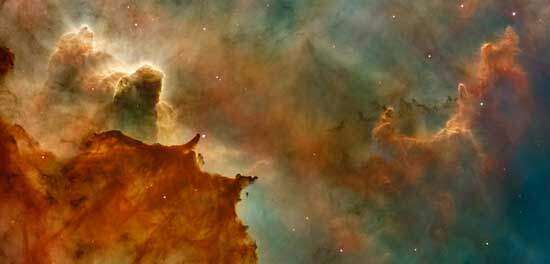What Do Adventists Believe About Creation in the Bible?
Seventh-day Adventists believe that God is the creator of our world. They come to this conclusion from the first book of the Bible—Genesis. The account there tells us that God took six literal days to form the earth and all it contains, including us humans.
Here are some questions we will answer about our origins and that of our planet:
- Why do Adventists believe in Creation?
- If God created everything, where did He come from?
- How old is the universe?
- How was the world created?
- What was the order of events at Creation?
- How was humanity created?
- How does Creation tie in with salvation?
This belief in Creation is foundational to Adventism, so much so that one of our fundamental beliefs is on this topic. It reads:
“God has revealed in Scripture the authentic and historical account of His creative activity. He created the universe, and in a recent six-day creation the Lord made ‘the heavens and the earth, the sea, and all that is in them’ and rested on the seventh day.
Thus He established the Sabbath as a perpetual memorial of the work He performed and completed during six literal days that together with the Sabbath constituted the same unit of time that we call a week today.
The first man and woman were made in the image of God as the crowning work of Creation, given dominion over the world, and charged with responsibility to care for it. When the world was finished it was ‘very good,’ declaring the glory of God.”
Let’s start by diving into an essential question.
Why do Adventists believe in Creation?
Adventists believe in Creation because the first words of the Bible tell us that “in the beginning, God created the heavens and the earth” (Genesis 1:1, NKJV).
We exist, the earth exists, the stars exist, and the universe exists. And it all had to come from somewhere, right? But from where?
For Adventists, the reason is that God created everything.
But many people have a hard time grasping the idea of God and have alternative explanations for the origin of the universe and all that is in it.
For example, the famous Greek philosopher, Aristotle (368–348 bc), believed the world had always existed.
On the other hand, the Big Bang Theory says the universe had a beginning. That there is a point when the universe came into existence.
One scientist has even argued that the universe arose from absolutely nothing. He concluded that “nothing is the foundation of everything.”1
But from a biblical perspective, God is the originator of everything.
If God created everything, where did God come from?
 The Bible doesn’t say where God came from. Instead, it presents Him as an eternal Being.
The Bible doesn’t say where God came from. Instead, it presents Him as an eternal Being.
This means He has always existed. There is no stated time when He came into existence.
In trying to help us wrap our minds around this concept, the Psalmist puts it this way:
“Before the mountains were brought forth, or ever You had formed the earth and the world, even from everlasting to everlasting, You are God” (Psalm 90:2, NKJV).
God is not just one entity among others in the created world.
He exists above, beyond, and outside of creation, a category that is uniquely His alone. And one that finite, created beings, like ourselves, have a hard time grasping.
People ask about the origin of God because they are used to everything else having a source or a known origin. That makes sense because every day of our lives, we encounter finite, created things.
But God is eternal.
He doesn’t have a source. He doesn’t have an origin. He has always existed and always will.
That’s why Job declared:
“How great is God—beyond our understanding! The number of His years is past finding out” (Job 36:26, NKJV).
Maybe everything else needs an explanation for how it got here, but not God.
So, let’s talk about the universe for a moment.
How old is the universe?
 The Bible doesn’t give us the age of the universe as a whole. The account of Creation in the book of Genesis is in the context of our earth and life here.
The Bible doesn’t give us the age of the universe as a whole. The account of Creation in the book of Genesis is in the context of our earth and life here.
But other Bible texts talk about God as the creator and sustainer of all the universe, even other worlds (Hebrews 1:2; Colossians 1:15–17).
There is evidence from the Bible that other intelligent life existed before life on earth did.
For example, the book of Job talks of other beings praising God at the creation of the earth:
“Where were you when I laid the foundations of the earth?… When the morning stars sang together, and all the sons of God shouted for joy” (Job 38:4–7, NKJV).
Some kind of intelligent life rejoiced at the work God had done here.
Even if we don’t know exactly how old the universe is, that doesn’t mean we can’t be in awe of how amazing it is and how amazing God is—especially because He took the time, care, and love to create it.
We’ll explore His creation of the world next.
How was the world created?
 According to the Creation story in Genesis 1 and 2, God created the world—and all life on it—in six days by speaking it into existence. It was a deliberate and conscious act on His part.
According to the Creation story in Genesis 1 and 2, God created the world—and all life on it—in six days by speaking it into existence. It was a deliberate and conscious act on His part.
In other words, God had purpose and foresight in making our world and the life on it.
This belief, also known as young earth creationism, is in contrast with the idea of complete evolution, which has no place for purpose, direction, or intentions. Instead, it suggests that only blind forces and mutations were the means for the creation and existence of life on earth. It isn’t in line with Adventists’ creationist view of the world.
The Bible is clear that God spoke our present world into existence.
Over and over, we read that “God said, let there be” such and such, and then such and such happened (Genesis 1:3,6,9,11,14,20,24; Genesis 1:26, NKJV).
The Psalmist expressed this fact when he wrote:
“By the word of the Lord the heavens were made…. For He spoke, and it was done; He commanded, and it stood fast” (Psalm 33:6–9, NKJV).
The book of Hebrews also explains:
“Through faith we understand that the worlds were framed by the Word of God, so that things which are seen were not made of things which do appear” (Hebrews 11:3, NKJV).
And John tells us that this Word, through which everything was created, was Jesus Himself:
“In the beginning was the Word, and the Word was with God, and the Word was God. He was in the beginning with God. All things were made through Him, and without Him nothing was made that was made….
“And the Word became flesh and dwelt among us, and we beheld His glory, the glory as of the only begotten of the Father, full of grace and truth. And of His fullness we have all received, and grace for grace. For the law was given through Moses, but grace and truth came through Jesus Christ” (John 1:1–5; John 1: 14–17, NKJV).
God’s words are powerful; they can create entire worlds! And those same words created the home that we know—planet earth.
How? Here are some specifics.
What was the order of events at Creation?
God created our planet in six literal days. He followed a logical pattern of creating an environment and then filling that environment.
But even before those six days, the earth already existed. It was “without form and void” (Genesis 1:2, NKJV).
The Seventh-day Adventist Church doesn’t have an official position on when the pre-creation earth was formed, though some think it was created at the beginning of the six days.
Regardless, Adventists believe that God alone created it.
The six-day sequence of events in Creation are:
- Day one—God divided the light from darkness (Genesis 1:3–5)
- Day two—God divided the earth from the sky (Genesis 1:6–8)
- Day three—God divided the land from the sea and made vegetation (Genesis 1:9–13)
- Day four—God made the sun, moon, and stars (Genesis 1:14–19)
- Day five—God brought forth water animals and birds (Genesis 1:20–23)
- Day six—God created land animals and the first humans, Adam and Eve (Genesis 1:24–32; 2:7, 18–23)

Note how there’s nothing that hints at chance having a role in it.
On the contrary, every word points to Creation as the planned and purposeful act of a loving God. A God who created everything exactly as He wanted it.
All through the Creation account, God looked at what He had made at each stage and said that it was “good” (Genesis 1:4, 10, 12, 18, 21, 25).
And when He finished creating everything, He declared it to be “very good” (Genesis 1:31, NKJV).
It sounds vastly different from the billions of years of suffering, death, violence, and “survival of the fittest” that evolution suggests led to life as we know it today. That hardly sounds “good,” let alone “very good.”
We can take comfort in knowing God wanted us to exist—each of us with our unique thoughts, personality, and perspective.
And God was also intentional in the timing of Creation. He didn’t let it sit for thousands of years between each act of creation. More on that next.
Are the days of Creation in Genesis literal?
 Adventists believe the days of Creation are literal 24-hour days—just as we measure a day today.
Adventists believe the days of Creation are literal 24-hour days—just as we measure a day today.
Three reasons support this conclusion:
- The word for “day” in the Genesis account is yom, which all through the Old Testament means one day as we understand it.
For example, in lamenting the day of his birth, Job cried out:
“May the day [yom] perish on which I was born” (Job 3:3, NKJV).
- Each day of the Creation account included the phrase “and there was evening and morning” (Genesis 1:5, 8, 13, 19, 23; Genesis 1:31, NKJV).
In the Bible, a day begins with sunset. So naturally, each day mentioned an evening and then a morning.
And just as days today have a literal evening and morning, the Bible uses that phrase to show us that each day of Creation took place within the span of a literal evening and morning—one day.
The phrase “and there was evening and morning” was the Bible’s way of saying “24 hours.”The Old Testament scholar and theologian Richard Davidson confirms,
“The phrase ‘evening and morning’ appearing at the conclusion of each of the six days of creation is used by the author to clearly define the nature of the days of creation as literal 24-hour days.”2
- The Ten Commandments, written by the finger of God Himself, specify that He created the world in six days (Deuteronomy 9:10).
The fourth commandment reads in part:
“For in six days the Lord made the heavens and the earth, the sea, and all that is in them, and rested the seventh day. Therefore the Lord blessed the Sabbath day and hallowed it” (Exodus 20:11, NKJV).
The teaching of a six-day Creation is so important that God commands us to set aside every seventh day as a memorial of it. That commandment is the reason Adventists keep the seventh-day Sabbath.
But now, let’s go back one day in the Creation week to when God created humans.
How was humanity created?
 Adventists see a direct relationship between the doctrine of Creation and the nature of humanity. The biblical account is clear that humans are the direct and purposeful creation of God to reflect Him.
Adventists see a direct relationship between the doctrine of Creation and the nature of humanity. The biblical account is clear that humans are the direct and purposeful creation of God to reflect Him.
“The Lord God formed man of the dust of the ground, and breathed into his nostrils the breath of life; and man became a living being” (Genesis 2:7, NKJV).
The creation of Adam was unique from the way God created the rest of the earth. While God spoke everything else into existence, He got down and formed Adam from the dust.
But here is where it gets even more special.
Twice, Genesis says that humans—both male and female—were made in God’s image.
In deciding to make man, the Godhead said, “Let Us make man in Our image, according to Our likeness” (Genesis 1:26, NKJV).
“So God created man in His own image; in the image of God He created him; male and female He created them” (Genesis 1:27, NKJV).
This is something that wasn’t said for any other creature.
And it presents a distinct and unmistakable contrast to evolutionary theory, which teaches that human beings are merely evolved animals—that we are just “advanced apes.”
But the biblical record depicts human beings as specially made by God. Understanding this fact helps us know Him—and ourselves—better.
Why is it important to understand how God created humanity?

Understanding our creation gives us a proper sense of our infinite value and unique identity.
An evolutionist once described humanity as “blobs of organized mud.”3
But if human beings are merely the chance products of billions of years of evolution, then nothing is particularly sacred about us or life in general.
In the late 1800s and early 1900s, when the evolutionary theory was taking hold, Social Darwinism was an application of this theory. It taught that by helping the weakest and the less fit to survive, society was not only going against nature but also hurting itself in the process.
Social Darwinism used the theory of evolution to justify not giving aid to the poor or the needy and not helping those fighting disease.
Some took this notion even further. Instead of just letting Mother Nature weed out the weak, why not help her along? The idea became known as eugenics and involved forced sterilization, forced abortions, and, in some cases (such as the Holocaust), killing all the “undesirables.”
Adventists reject this thinking based on their understanding of human origins. They see human beings—all human beings—as made in the “image of God.”
And even more importantly, Adventists believe that Jesus Christ died for every human being, making them of equal value in the eyes of God (John 3:16; Romans 5:8).
While that’s amazing to consider, you might be wondering why much of science contradicts the biblical perspective. Let’s look at that concern now.
Why doesn’t current science agree with the Bible’s teachings about our origins?
 Science studies only natural things; it looks for natural explanations for natural events and can’t explain the supernatural.
Science studies only natural things; it looks for natural explanations for natural events and can’t explain the supernatural.
In fact, science must table any supernatural explanation because something must be able to be observed, experimented, and repeated to have an explanation. Otherwise, it will remain a theory.
The creation of our world was a purely supernatural event, an event beyond the reach of science, at least as now practiced.
Thus, whatever conclusion science draws about our origins will inevitably clash with the supernatural explanation given in Scripture, particularly if we consider that Creation isn’t just about how we got here; it’s also tied in with our redemption.
How does Creation tie in with salvation?
Creation reveals what our world was supposed to be and who humans were designed to be—reflectors of the image of God. Though sin has marred that purpose, Creation reminds us that we can regain it through the gift of salvation we receive from Jesus.
Through Adam and Eve’s choice to disobey God, we became separated from God, our relationships became strained, and we inherited the tendency to do wrong. Our world became filled with suffering and death too.
 But Creation shows us what God will restore us to. With His help, we can reflect His image and someday be united with Him in a harmonious new earth.
But Creation shows us what God will restore us to. With His help, we can reflect His image and someday be united with Him in a harmonious new earth.
And all of that begins with acknowledging God’s incredible love for us.
He claims us as His creation. But when we messed up, He also claimed us as His special, redeemed possession through Jesus.
As a result, we can call Him “Father” (Matthew 6:9).
Calling our Creator “Father” gives our relationships with other human beings a new perspective too. We see them as children of God as well. Brothers and sisters. And this inspires love and the realization of the dignity inherent in every human being.
Can you imagine what the world would look like today if we all had this understanding?
It would be a different place and experience for all of us. It would be like living in the Garden of Eden before sin entered the world.
Thankfully, we have the promise of inheriting a world like that someday (Revelation 21). Our Heavenly Father—the Creator of all things—is also a re-Creator. He gives us the hope of salvation and a world restored to Creation-like beauty.
Related Articles
More Answers
Why Many Seventh-day Adventists Choose a Vegetarian Diet
Why Many Seventh-day Adventists Choose a Vegetarian Diet?You may have an Adventist friend who is vegetarian, or maybe you’re attending a Seventh-day Adventist Church for the first time and notice the potluck doesn’t have any meat. This isn’t unusual in Adventism. In...
The Health Benefits of Fresh Air You Should Know About
The Health Benefits of Fresh Air You Should Know About“When you can’t breathe, nothing else matters,” the American Lung Association tells us. And while that’s true, the kind of air you’re breathing will determine the health benefits you experience. Breathing fresh...
What Do Seventh-day Adventists Choose to Eat?
What Do Seventh-day Adventists Choose to Eat?Food blogs overwhelm the internet; food fads are all the rage; and copycat and healthy versions of food are the subject of many a get-together. Eating—and eating the best way—is a big deal. And everybody has a different...
10 Incredible Ways Sunlight Can Improve Your Health
10 Incredible Ways Sunlight Can Improve Your HealthAre you concerned about sunlight’s negative effects? You might be the one who lathers on the sunscreen and covers up when you go outside. Or maybe you avoid being outside as much as possible. You might be surprised,...
Why Is Water So Important?
Why Is Water So Important?We all know that water is a substance we can’t live without. It quenches our thirst and keeps us hydrated on the inside. And it’s necessary for hygiene and cleansing on the outside too. But did you know that the cleansing properties of water...
Ellen White’s Writings and the Adventist Health Message
Seventh-day Adventists are known for their emphasis on healthy living. And Ellen G. White was a significant influence in the development of this priority and practice among Adventists.
Health Clinics
Ellen White and Adventist Healthcare—Ahead of Their Time Medical care in the mid-1800s was primitive, to say the least. Basic concepts we take for granted—such as proper handwashing or recognizing the dangers of bloodletting—were nonexistent. And doctors often had...
What Did Ellen White Teach about Vegetarianism?
What Did Ellen White Teach about Vegetarianism?One thing you might have heard about Seventh-day Adventists is their emphasis on a vegetarian lifestyle. If you’re wondering why that is, it goes back to our church’s humble beginnings: As Adventists studied the Bible,...
How Ellen White’s Teachings Can Improve Your Health
How Ellen White’s Teachings Can Improve Your Health Healthcare in the nineteenth century was said to leave “more disease than it took away” with its use of bloodletting and “medicines” like mercury and arsenic.1 As people questioned these methods, new approaches...
Change Your Perspective on Life with These 5 Mindsets
5 Biblical Mindsets to Change Your Life for the Better Sometimes, life is just plain hard. There’s no way around it. So would thinking about things differently really change anything? Our perspective on life, and everything it throws at us, affects more than we’re...
Bible Promises for When You’re Worried or Fearful
Bible Promises for When You’re Worried or Fearful The Bible is full of beautiful promises that can comfort us in a variety of situations. They can give us hope when we are hopeless, make us feel grateful for God’s love, and comfort us when we’re grieving or suffering....
12 Practical Ways to Overcome Worry
12 Practical Ways to Overcome Worry DISCLAIMER: This content is for informational purposes only. It does not constitute any professional medical advice and is not intended as a substitute for professional mental health therapy. It’s easy to get stuck in a cycle of...
How the Bible Talks About Worry, Fear, and Anxiety
How the Bible Talks About Worry, Fear, and Anxiety Worry and fear are the ingredients of anxiety. It’s easy to see how the world isn’t perfect—and the anticipation of a bad event or experience (that may or may not even happen) can end up draining the peace and...
How to Calm Anxious Thoughts, Using the Bible
How to Calm Anxious Thoughts, Using the Bible You were expecting a phone call from your daughter half an hour ago, and she still hasn’t called. She’s also not answering your calls. You feel your heart thumping as your thoughts race: What if she’s been in a car...
What You Should Know About the Adventist Health Studies
What You Should Know About the Adventist Health StudiesYou may have heard that Seventh-day Adventists care about health. But what you may not know is that Adventists have been the subjects of long-term research into lifestyle and health. Since 1958, researchers from...
Benefits of Sunlight
Yes, There Are Health Benefits of SunlightDespite the bad reputation it’s gotten, sunlight is generally associated with positivity, as shown by songs like “You Are My Sunshine,” or phrases that refer to delightful people as having a “sunny disposition.” There’s a...
Why Your Body Needs Rest for Optimal Health
Why Your Body Needs Rest for Optimal HealthStruggling to think straight? Wondering why you can’t remember that important tidbit you heard earlier today? Feeling like your emotions are about to explode? These are just some of the symptoms that can reveal your need for...
The Seventh-day Adventist Diet: One of Our Key Longevity Secrets
The Seventh-day Adventist Diet: One of Our Key Longevity SecretsOats, avocados, lentils, tofu—probably not what you first think of in a standard American diet. But if you show up at the home of an Adventist, chances are you may be served one of these staples. Out of a...
Why You Need Fresh Air
Why You Need Fresh Air“When you can’t breathe, nothing else matters,” the American Lung Association tells us. We couldn’t agree more! Breathing in clean air is an essential part of caring for our bodies, which God has given us. Together with other health principles,...
Sabbath Meal
Everything You Need to Know About Sabbath MealsFor Seventh-day Adventists, sharing a Sabbath meal with friends and family is one of the most special and memorable parts of the Sabbath. That’s why we want to share with you all about Sabbath meals and why they’re such a...
Adventists and Healthy Living
Adventists and Healthy LivingWhat’s the Adventist “Health Message” All About? One thing Seventh-day Adventists are known for is their emphasis on living healthy lives. Since our bodies are living temples of the Holy Spirit (1 Corinthians 6:19, 20), we strive to stay...
Water’s Importance—Physical Benefits and Spiritual Applications
Water’s Importance—Physical Benefits and Spiritual Applications We all know that water is a substance we can’t live without. Not only does it quench our thirst and keep us hydrated from the inside, but it’s necessary for hygiene and cleansing on the outside as well....
How Important is a “Day of Rest?”
How Important is a “Day of Rest?” Why God Created a Day for Downtime by Martin Casper Do you ever experience the feeling of complete overload? Do you feel like the only way you can get ahead is by slamming it 24/7? I hear these types of comments more and more...
7 Reasons Why a Day of Rest is Important
7 Reasons Why a Day of Rest is ImportantWe live in a fast-paced world. It seems as if success is measured in how much you can do in a short amount of time. (Extra points for the service or product that is available 24/7). The idea that we will be more successful if we...
How do Adventists choose what to eat?
How do Adventists choose what to eat?Every day, parents go through the ritual of getting their kids to eat what is healthy and good while trying to steer them away from what can hinder the growth of their developing bodies. Nutritionists work with their clients to...
How Can I Have a Better Marriage?
Is it possible to have a happy marriage?
Why are many Adventists Vegetarian?
Why are many Adventists Vegetarian?The diet intended for man is outlined in Genesis 1:29, “And God said, ‘See, I have given you every herb that yields seed which is on the face of all the earth, and every tree whose fruit yields seed; to you it shall be for food.’”...
Didn’t find your answer? Ask us!
We understand your concern of having questions but not knowing who to ask—we’ve felt it ourselves. When you’re ready to learn more about Adventists, send us a question! We know a thing or two about Adventists.























